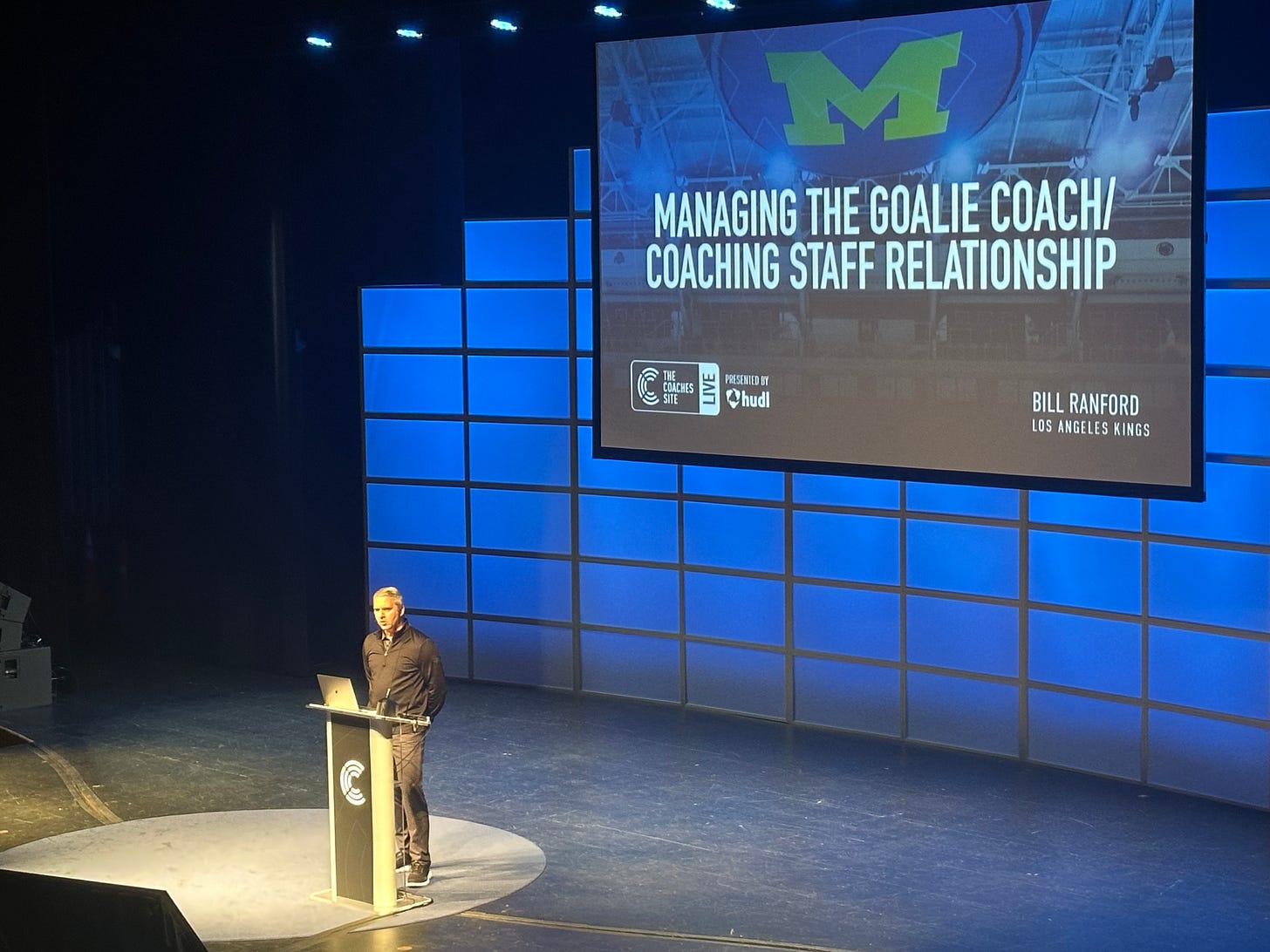What do NHL teams actually need from their goalie coach?
Let's look at the vacancy in Detroit and use some examples from other teams.
I’ve been thinking a lot about the role of NHL goalie coaches lately.
The Florida Panthers have won back-to-back Stanley Cups now and been to three straight finals. The Panthers also have a “goaltending excellence department” that features both goalie coach Rob Tallas, senior advisor Roberto Luongo, and goaltending consultant François Allaire — who should be in the Hockey Hall of Fame.
The Edmonton Oilers goalie coach, Dustin Schwartz, had to put in extra work throughout the playoffs to help manage the Stuart Skinner fall, rise, and then fall again, while the Dallas Stars drama surrounding Jake Oettinger included the now-fired head coach, Pete DeBoer, making a big decision without conferring with his goalie coach, Jeff Reese.
In Detroit, the Red Wings are actively looking for a new goalie coach after firing Alex Westlund this spring, a move that seems to align with the murmurs that Steve Yzerman would like to re-haul his goaltending, again, after seeing multiple goalies burnt out and then discarded in Detroit the past couple years.
Last week I was also at coaches clinic in Ann Arbor, TCS Live, where I heard Los Angeles Kings director of goaltending Bill Ranford speak on the goalie coach, head coach dynamic.
Ranford was the goalie coach in Los Angeles from 2006 to 2023 before his promotion to the head of his department. He won two championships in that role, and worked closely with Jonathan Quick, a goalie that was actually one of the better innovators of the common era.
Ranford also worked closely with then Kings and now Red Wings coach Todd McLellan.
With all of that in mind, I wanted to use that as a bit of a case study here, especially since Detroit, to my knowledge, has yet to hire Westlund’s replacement and chatter in the goalie coach world is that the Red Wings might also be looking at other changes in their goalie department as well.
So, to get to our question, what are the Red Wings, or any NHL team for that matter, looking for in their goalie coach?
According to Ranford, McLellan’s go-to line was that he “didn’t want to worry about the goalie.” It was Ranford’s job to take that off his plate, allow him to coach the other parts of the team, and he wanted information in a quick-hitting, matter-of-factual manner.
As Ranford put it, Mclellan didn’t want a story about why something did or didn’t happen with the Kings goalies, he just wanted the reason and a conclusion that he could operate off of.
It’s also important to remember at the NHL level the goalie coach is more of a skills refiner and goalie confidant than a pure developer of talent. Any goalie that wants to rip and down and re-work their game, changing their stance for example, is often done in the summer with their own personal goalie coach.
The goalie coach also plays a vital role, particularly in today’s NHL, of helping making informed decisions on when and how often each goalie should play. As the league has become more of a tandem league, how this is handled becomes more vital.
With Detroit, no matter who the tandem is — maybe it’ll still be Cam Talbot and Petr Mrázek — Ranford has a good understanding of how the new goalie coach will have to work with Mclellan.
“Build the case, but he doesn’t want to hear a big long story,” Ranford said. “Just state the facts and move on, then he can make the final decision.”
Those facts matter, Ranford said, and when it comes to coaching goalies the key, he said, is to be able to be honest about what is actually a good and bad goal against.
It’s not the goalie coach’s job to defend poor play to the head coach, Ranford said, but it is important to provide the right context when the situation arises and be able to “read the room” for when to address that with the coach.
One thing Ranford brought up, again using McLellan as an example, was how in between periods it was all about reading the coach’s mood on whether he’d go in-depth or not on whether a goal was good or bad.
Ranford also talked about how important it was to not make concrete long-term plans, and how much McLellan valued some flexibility in that. For example, Ranford talked about a time the Kings didn’t start Quick because they were too committed to a usage plan and it led to the goalie losing rhythm after a hot streak.
For the Red Wings, especially with the potential aging tandem, the goalie coach will be more of week-to-week planner, especially since Talbot doesn’t practice as much anymore. They’ll also be responsible for understanding how each goalie operates, which seems to have been a slight disconnect with Westlund at the end of his time in Detroit.
So the next Red Wings goalie coach, and I know of at least one person that has turned down the job, will have to find a way to answer some of the questions that Westlund wasn’t able to handle to McLellan’s satisfaction.


